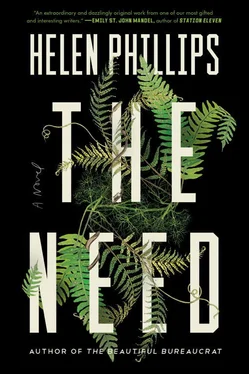“Mommy!” the children yelled as they pulled on opposite ends of the stethoscope, waiting for her to intervene with some just plan. “Mommy! Mommy!”
When Moll failed to respond, they looked over at her. Their shared chant took on a tenor of doubt: “Mommy? Mommy? Mommy?”
Viv flung herself on the prone body, and then Ben did too, Viv ferociously patting Moll’s face, Ben tugging on her hair and fingers.
Moll did not react.
The children scooted back a bit, stared at her.
“Are you alive?” Viv shouted at Moll’s body, beginning to cry.
Molly had to go in. Never mind that they shouldn’t see two mothers at once. Their caretaker was toxic with grief. It was insane that she had ever let Moll be with them.
She was at the back door, about to stride through it, when Moll opened her eyes.
“Oh Mama,” Viv said. Her voice sounded like the voice of a much older person.
Ben threw himself over Moll, matching his torso to her torso, his arms and legs miniature versions atop hers. That well-known weight of him.
Viv sat cross-legged at the crown of Moll’s head, prying Moll’s head off the floor and into her lap. Moll should have resisted (it was ridiculous, a grown woman with her head in a little girl’s lap), but she did not resist, she put her head in Viv’s lap, and Viv stroked her face.
Molly in the cellar, listening on the baby monitor, knew when Moll went in to nurse Ben in the rocking chair (the milk itching in her own echoing breasts); knew when she stood to place him in the crib; knew when Viv ran to the bookshelf to choose a book.
Moll had gathered herself. Was managing to do everything just so.
Once she was certain that Moll was ensconced in the children’s room, getting Viv to sleep and probably, in the process, accidentally falling asleep herself, Molly exited the basement and entered through the back door.
She sat on the couch, preparing her words, gathering her bravery and her cruelty.
You have to admit.
This is not.
This cannot.
You are a danger to them.
It was a long time before Moll came down the hallway, unsteady. Molly knew that feeling, felt it in herself as she witnessed it in Moll, the effort of pulling oneself out of sleep after those involuntary bedtime naps. The slight nausea, the bloodshot eyes.
Moll, foggy, did not notice Molly. She stood in the entry to the kitchen, leaning against the wall, devastated, surveying the detritus of dinner, the dishes and the crumbs, but Moll’s devastation was universes away from Molly’s nightly despair of resurfacing from the children’s bedroom into the disorder of the house, that mundane fleeting luxurious despair.
Watching Moll staring at the mess (staring at it, not seeing it), Molly found her severity softening, losing its shape. She tried to keep it firm, its hard edges intact.
But Moll’s face was the color of grief.
“I can help,” Molly said eventually.
She had struggled to land on those three words. She had considered so many others. You have to. You are a.
When Moll glanced over at her, Molly realized that she had in fact already registered her presence. Was not surprised by her voice.
You are a , Molly wanted to say, you are a , but found herself unable.
You could go back, or try to , she thought to say.
But go back how? Who knew what rules governed the Pit, the seam?
And to what? To whom?
She thought of the other David, the bereaved one. She saw his face with sudden, terrible clarity.
Molly got up off the couch and walked over to Moll, who scooted into the kitchen, perhaps to make room for Molly in the space, though it seemed more like someone straining out of the reach of flames.
Molly opened the cabinet under the sink and got the orange-clove spray and misted the countertops. The spray bottle sputtered, almost empty.
“We’re running out,” Molly said, to combat the void, Moll’s epic silence. It took her a second to notice that she had said we . She could pretend she had intended the we to refer to herself and David. But she knew whom she had meant by we .
They cleaned together in the known order, listening to the sound—or the nonsound—of the children’s sleep. A curious camaraderie with the person she wanted to eliminate, the person who wanted to eliminate her.
“What’s this?” Molly said, reaching under the table to pick up a piece of paper. It bore a series of letters in Viv’s oversize handwriting: ILVBTULVMIEXEBX.
“‘I love you because you love my coloring book,’” Moll translated.
Amused, Molly looked at Moll, but she kept her head down, sweeping the floor.
“ Bebock ,” Moll said, “means peacock . When he says peacock , he means pigeon .”
And Molly thought, a passing flash: Maybe. Maybe we could —
“Mommy,” Viv sang out from the bedroom. “I’m not asleep anymore.”
Molly stiffened, awaited Moll’s request. Her begging eyes.
But Moll had already given up, had already put down the broom, was already heading toward the back door, her shoulders wilting with fatigue.
“I have to pee,” Viv said, emerging from the bedroom just as Moll vanished.
She looked skinny and sleepy, her curly hair dark and huge around her small face.
Molly fell toward her, grabbed her and held her.
“Mom,” Viv said, “I said I have to pee.”
Molly smelled her hair, her eyebrows.
“Excuse me,” Viv said. “Mom!”
“Okay fine go.”
After Viv had mounted the toilet, she requested a coloring book.
“No way,” Molly said. “You’re going right back to bed.”
Viv sighed.
“Ready to get off or are you still peeing?”
“Still peeing,” Viv lied.
Molly decided to let her sit for another couple of minutes while she completed Moll’s interrupted sweeping task.
“The bugs are coming!” Viv cried out.
Molly ran back into the bathroom. It was illuminated only by the glow of a night-light.
“Where?” Molly said.
“What?” Viv said.
“The bugs.”
“What bugs?”
“You screamed ‘The bugs are coming!’”
Viv laughed. “I did?”
Perplexed, Molly handed her three squares of toilet paper.
“Can you stay with me the whole night?” Viv said.
“You don’t sleep as well if I’m in your bed.”
“But I’m so scared tonight.”
“Why?” Viv’s fear refreshed Molly’s anxiety, made it newly raw and pressing.
“I don’t feel safe.”
“Why not?” A child’s sixth sense that something was unsteady in the household—that her mother was not always her mother?
“Please, just stay with me the whole night.”
“Well,” Molly said, trying to ignore the agitation rising in her, “maybe.”
“Yay.” Viv hopped off the toilet and grabbed Molly’s hand.
It had always seemed a bit deceitful to Molly, the way we put our children to bed in soft pajamas, give them milk, read them books, locate their stuffed creatures, tell them that all is well, there’s nothing to be scared of, as though sleep isn’t one-sixteenth of death. When they resist the prospect of sleep, of long dark lonely hours, intuiting that this is indeed a rehearsal for death, we murmur to them, we rub their backs, pretending they will never die. Little do they know that behind our backs we keep our fingers crossed, and that our hearts too thump with anguish when we turn off our bedside lamps.
She rubbed circles around Viv’s back with the palm of her hand.
“Don’t worry.” Sleep is not a sip of death. “Don’t worry.” I am here and I always will be. “Don’t worry.”
Читать дальше





![Unknown - [Carly Phillips] The Bachelor (The Chandler Brothe(Bookos.org) (1)](/books/174132/unknown-carly-phillips-the-bachelor-the-chandle-thumb.webp)






